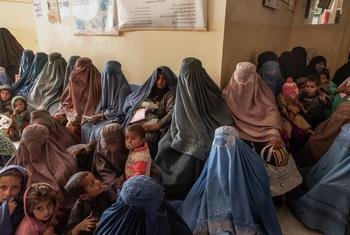Participants in a debate at the UN security body recognise the key role of women in peace processes and in all areas of public and social life. Michelle Bachelet denounces abuses against women in Afghanistan. A new fund will support women’s advocates in conflict or crisis settings.
“Peace decisions that do not reflect women’s voices, realities and rights are not sustainable. There must be clear advocacy and meaningful investment in women human rights defenders and peacebuilders,” said the UN High Commissioner for Human Rights on Tuesday.
Participating in a UN Security Council open ministerial debate on violence against women in peace and security processes, Michelle Bachelet called for closing the digital divide, expanding financial support and increasing accountability for attacks and intimidation against women.
“The work of addressing discrimination, inequality, denial of women’s civic space and gender-based violence must also be a priority for peacebuilding,” she stressed.
Bachelet highlighted the role of the Security Council in the effort to build peace by and for women; however, she stressed that between 1992 and 2019, only 13% of negotiators, 6% of mediators and 6% of signatories in major peace processes around the world were women.
Pandemic worsens the situation
“And that was before the pandemic broke out and before a wave of escalating conflicts, undemocratic political transitions and disastrous humanitarian crises engulfed many societies, further diminishing women’s rights,” she warned.
She explained that the situation now facing women human rights defenders is far worse, as are the prospects for women’s full, not token, participation in shaping and building peace.
To illustrate this assertion, she cited that only 1% of funding to fragile or conflict-affected countries goes to women’s rights organisations and reported that in 2020 her Office verified 35 killings of women human rights defenders, journalists and trade unionists in seven conflict-affected countries where data could be retrieved.
“This number, which is undoubtedly an undercount, exceeded the confirmed numbers of killings in 2018 and 2019,” she noted.
She added that patterns of abuses by state and non-state actors against women defenders of gender equality and sexual and reproductive rights among other causes have also been documented, asserting that such attacks seek to deter women’s participation and leadership.
Exclusion of women in Afghanistan
During her address, the High Commissioner referred to the case of Afghanistan, highlighting the exclusion of women from the de facto Cabinet and other key forums and warning that this suppression greatly undermines the ability of rulers to ensure a lasting peaceful future.
“Afghan women have been excluded from decision-making that affects their lives and families, and have been prevented from fully exercising their right to participate in all spheres of civic and public life,” she said.
Bachelet also considered that in the face of a humanitarian disaster of unprecedented proportions, the country needs all its people to come together. “Instead, the denial of the fundamental rights of women and girls is greatly damaging the economy and the country as a whole,” she warned.
She recalled that in recent months, many Afghan women human rights defenders, journalists, lawyers and judges have been forced to flee or go into hiding, often after repeated threats.
In this context, she urged the Security Council to ensure accountability for those responsible for human rights violations and abuses in Afghanistan, including against women and girls, “to enable the conditions for sustainable peace”.
“I call on all states to use their influence with the Taliban to promote respect for human rights,” he stressed.
She also called for the establishment of safe passage and resettlement programmes for Afghan women’s rights defenders, as well as an immediate halt to the deportation of Afghan women seeking protection in other countries.
The case of Colombia
Bachelet contrasted the situation in Afghanistan with the case of Colombia’s 2016 peace agreement, which included extensive participation of women and targeted gender measures.
“The Truth Commission and the Special Jurisdiction for Peace have also promoted the participation of women, and the Unit for the Search for Missing Persons has recognised the fundamental role of women in that search,” she said.
However, she added that gender-specific measures must be strengthened on issues such as land reform, political participation, security guarantees and other points of the agreement.
She also recommended greater efforts to combat ongoing conflict-related sexual violence and to ensure that victims of such crimes are treated with dignity and have access to adequate protection, justice and reparations. “This work will serve the cause of justice and, therefore, peace,” Bachelet concluded.
Shared objective
The Security Council debate was hosted by Norway, which holds the Security Council presidency in January.
Norwegian Foreign Minister Anniken Huitfeldt highlighted persistent gaps in creating safe and enabling environments for women peacebuilders and human rights defenders to carry out their work and urged working towards the shared goal of ensuring women’s full, equal and meaningful participation in all stages of peace processes.
Support Fund
In line with the Security Council, UN Women today launched the Women’s Humanitarian and Peace Fund, which aims to accelerate support for women human rights defenders on the frontlines of conflict and crisis.
UN Women Executive Director Sima Bohous and the Norwegian Minister of Foreign Affairs launched the Fund at a virtual event where they defined the resources as a new funding window for women human rights defenders working for inclusive peace and humanitarian action.
The Fund is a flexible and rapid global pooled funding mechanism that aims to revitalise action and increase resources for women’s participation, leadership and empowerment in peace and security processes and humanitarian responses.






